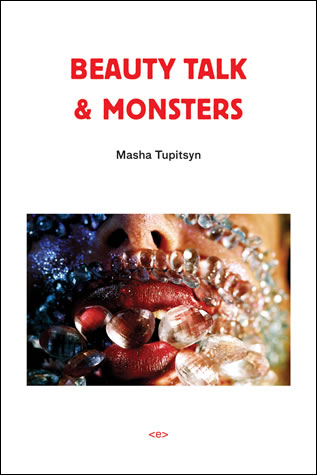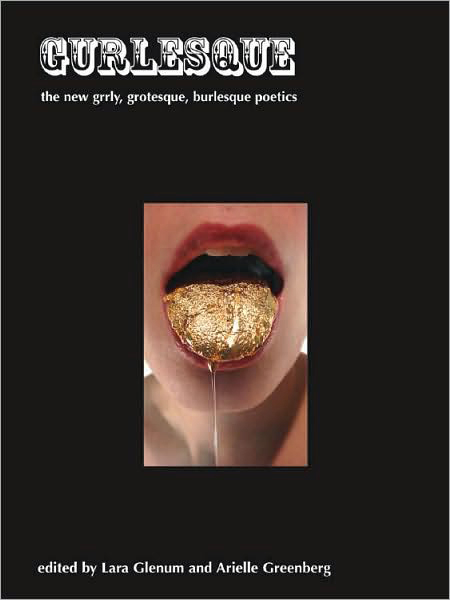
An Excerpt from Johannes Göransson’s Entrance to a colonial pageant in which we all begin to intricate
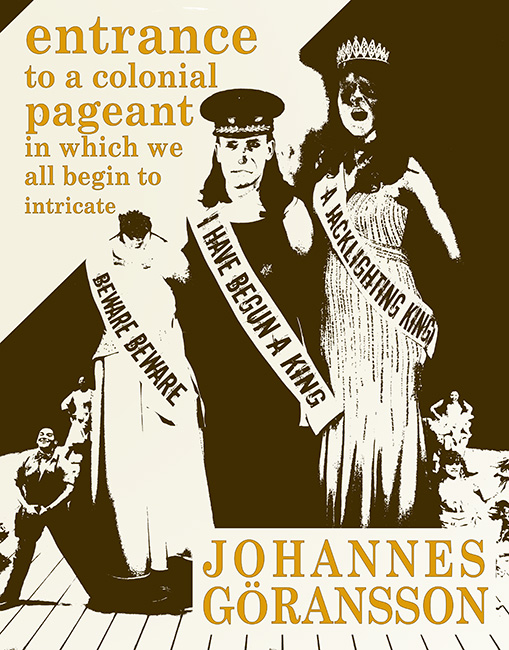
An excerpt from Johannes Göransson’s forthcoming new book Entrance to a colonial pageant in which we all begin to intricate is live at Tarpaulin Sky’s Chronic Content feature. I’ve read this book a few times this year already; it is insane sickly gorgeous power. It is a big thing. Preorder here.
Cohen, Julia. Triggermoon, Triggermoon. [2010]

“Julia Cohen’s poems will knock you out with their fresh logics like some moon-governed dream… this collection is half in the world and half in the ‘non-world’ that ‘occasionally rolls over you,’ utterly grounded in the domestic and wildly transformative.” —Elizabeth Willis
“The poetics enacted in Triggermoon Triggermoon is rare in its exuberance and delicate humanity, its wistful acceptance of imperfection as the human condition, imperfection as a kind of pet we grow to love and depend upon. I have grown to love and depend upon this book.”—Bin Ramke
77 interviews and now you people be happy goddamn you etc 14
5. Some MFA fuck will host the Oscars.
77. In other sad news:
14. Flash Fiction interviews Nicolle Elizabeth. I thank them.
My favorite part of it is that it isn’t getting another print run. Can I say that?
111. Kyle Hemmings interview at Dark Sky Magazine.
One of the biggest influences, besides other writers, was the nine or ten years I spent on the streets of New York, when I became addicted to the club scene.
1. Me here. My father brings novels to family reunions, funerals, and weddings. They are secreted in large pockets of his jacket. He brings them out, he reads them during the various proceedings. People have said things. But is this so wrong?
I Like It When Thom Jones’s First Person Narrators Break Into Essay in the Middle of a Short Story
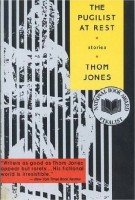 Thirteen pages into “The Pugilist at Rest,” which is a twenty-three page story, which has up till now told a Vietnam War story, the first person narrator goes to white space, then returns with this:
Thirteen pages into “The Pugilist at Rest,” which is a twenty-three page story, which has up till now told a Vietnam War story, the first person narrator goes to white space, then returns with this:
“Theogenes was the greatest of gladiators. He was a boxer who served under the patronage of a cruel nobleman, a prince who took great delight in bloody spectacles. Although this was several hundred years before the times of those most enlightened of men Socrates, Plato, and Aristotle, and well after the Minoans of Crete, it still remains a high point in the history of Western civilization and culture. It was the approximate time of Homer, the greatest poet who ever lived. Then, as now, violence, suffering, and the cheapness of life were the rule.” READ MORE >
{LMC}: On Gaythal Dethloff, Mother of Murder by Kellie Wells
Kellie Wells’s “Gaythal Dethloff, Mother of Murder” is a chatty story, in love with its own telling. Every description is exaggerated, dialogue is over-stuffed with podunky turns of phrase, actions are out of place but never really all that absurd. It’s like the costumer and the choreographer went to different schools. It’s a story that, while not always arresting, nonetheless lives and breathes with you if you let it. Like a puppet, it’s dead until you learn to move its strings and make it dance.
The story is essentially a monologue with witnesses. The first five hundred plus words are given over to describing the setting and the size of the characters. Before you’ve had a chance to forget, you’re reminded these are two of the tallest women in the world, and this is one of the fattest. There’s almost a kind of physical comedy in the constant repetition. By the time Gaythal tells how her good son, Nestor, became a serial killer, physical descriptions are largely unnecessary. As you read Gaythal’s monologue, you imagine it coming from the bed-ridden mouth of Jabba the Hutt. It feels like a bold move to front-load a story the way Wells does, to segment it so severely, but really it’s nothing new. Mark Twain’s tales are hinged in a similar fashion.
Nestor, once a great soup-kitchen chef, becomes a great murderer fulfilling his friend Ezekiel’s prophecy. Nestor kills and kills and kills. The murders, of course, come with a twist. Not a typical sicko, Nestor is doing his victims a favor. He kills Ezekiel to ratify him as a true prophet. He kills suicides so they can still get to heaven. Eventually, he ends up in jail.
Having given up her story, Gaythal shrinks in size. This all seems simple and straightfoward. We zoom back out of Gaythal’s monologue, back into our narrator’s thoughts, and, with her, feel a little let down. Gaythal’s had this bed-shaking, gospel-singing possession-like experience, but nothing really feels settled. Into the void of non-resolution comes a fun question: Are we dealing with ghosts? Is all of this more bizarre, more foreign than the initial description prepared us for? Without her brother’s love, the narrator is sure she’ll remain gigantic for eternity, but does she really mean eternity?
She says, “without being able to witness the faith of my one apostle ebb, I fear I am a lifer, Johnny-punchclock to the end of time. Without Obie, I am doomed to endless enormity. Without my brother’s love to engirdle me, I am an over-sized eidolon, hopeful opiate, just another reluctant cosmoplast roaming the backroads of the universe in search of the adoration of a sacrificial boy.”
Now, that’s hardly proof of ghosts, I know, but what does it mean?
Maybe a better question is why can’t I accept that maybe the narrator is just really sad she lost her brother, really alienated by her size, and desperate to find someone willing to worship her once more?
Power Quote: Foucault on Creation
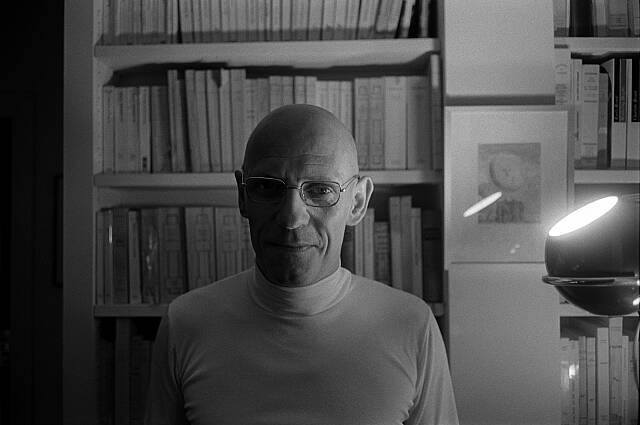
“My desire is that a book, at least for the person who wrote it, should be nothing other than the sentences of which it is made; that it should not be doubled by that first simulacrum of itself which is a preface, whose intention is to lay down the law for all the simulacra which are to be formed in the future on its basis. My desire is that this object-event, almost imperceptible among so many others, should recopy, fragment, repeat, simulate and replicate itself, and finally disappear without the person who happened to produce it ever being able to claim the right to be its master, and impose what he wished to say, or say what he wanted it to be. In short, my desire is that a book should not create of its own accord that status of text to which teaching and criticism will all too probably reduce it, but that it should have the easy confidence to present itself as discourse: as both battle and weapon, strategy and shock, struggle and trophy or wound, conjuncture and vestige, strange meeting and repeatable scene.”
[from the preface to the 1972 edition of History of Madness]
Deus ex McFlurry: An Interview with Amelia Gray

This year saw the release of Amelia Gray’s second book, a collection of texts from FC2 called Museum of the Weird. More than a simple consolidation of stories into a single body, or even a creation of texts within the confines of one body and a strong mind, Museum of the Weird seems an object bent out of the mysterious and new, taking foreign objects, mysterious relations, freak peoples, and bringing them together in a wilding chorus of the strange and, holy shit, the entertaining, addictive. Last month I traded a bunch of emails with Amelia re: the new book, how she works, the function of belief, fate, trying, and just what the hell is with all the eating of the hair that shows up all throughout her writing.
* * *
B: Amelia, your prose has an interesting quality of being at once familiar and intuitive, while also at a seeming kind of remove: beyond just using objects and animals as active elements, there is at all times a feeling that you are way back in there somewhere, narrating your way your way rationally out of these intensely messed up, or as you say “weird,” prompts. Do you think your writing is a kind of emotional propaganda? Is all writing emotional propaganda?
A: The phrase “emotional propaganda” strikes me as redundant because any effective piece of rhetoric contains some emotional element. In propaganda and in writing there is an actor with an intent and an audience, a communicating element and a receiving element. Effective propaganda sets up a world in which only one outcome is possible in the same way that a great tragic story drives its characters towards an inescapable fate. So sure, in the way each genre stands as a completed product, writing is a kind of message propaganda that ultimately stands to aid or question a cause/idea/person. Fiction tends to attack or support ideas like love or trust or babies via scenes and characters, while war propaganda, for example–thinking of WWII posters here–attacks or supports a country or cause using ideas like love or trust or babies. There’s an emotional appeal in each, driven towards a point or points.
The biggest difference is that war propaganda or motivational speeches tend to get created with a message in mind beforehand, while fiction doesn’t have to be created in the same way (though it can be). When I write, I tend to start with a very basic idea or image (all these could be described as prompts, sure) and write my way out of it. Someone creating a political image might do the opposite–begin with a larger point and work to seek out its supporting evidence–but we end up in roughly the same place.
“Propaganda” doesn’t insinuate emptiness, nor does it have to suggest a singular message, nor does it have to be negative, but it does suggest that there’s ultimately a point to every message. Same with fiction or poetry or advertising or journalism: if a string of letters doesn’t make any words, the point might be that there’s no point, or there might be a different point, point is there’s a point.
B: Once you have your idea, say, babies, how do you go about “writing your way out of it”? How do you know when you are “out”?
A: In the story I wrote about babies called “Babies,” I started with an ordinary fear of accidental pregnancy and unwilling parents and put it into the context of an irrational fear, where the baby is immediately there and there’s no time to have serious conversations or hold a baby shower or make a doctor’s appointment. The ordinary fear combines with the irrational fear and sets off a rational string of events. Obviously the woman is going to want to clean everything up. The baby is hungry, there’s no food in the house. That’s a more comic story, things are lightly touched. I could have made it more about umbilical cord infections or traumatic blood loss or flesh ripping or whatever, but I wanted to keep the real bumping up against the unreal, babies floating inside balloons. At the end I felt the impulse to make it a happy story, where the relationship is saved and the individuals are improved, and then I felt the impulse to crush that impulse in as few words as possible, and then I felt I was out. I had the plot of that story down fast, so I remember the impulses shifting. That’s not how it always goes but it’s how it went then.
November 29th, 2010 / 1:22 pm


